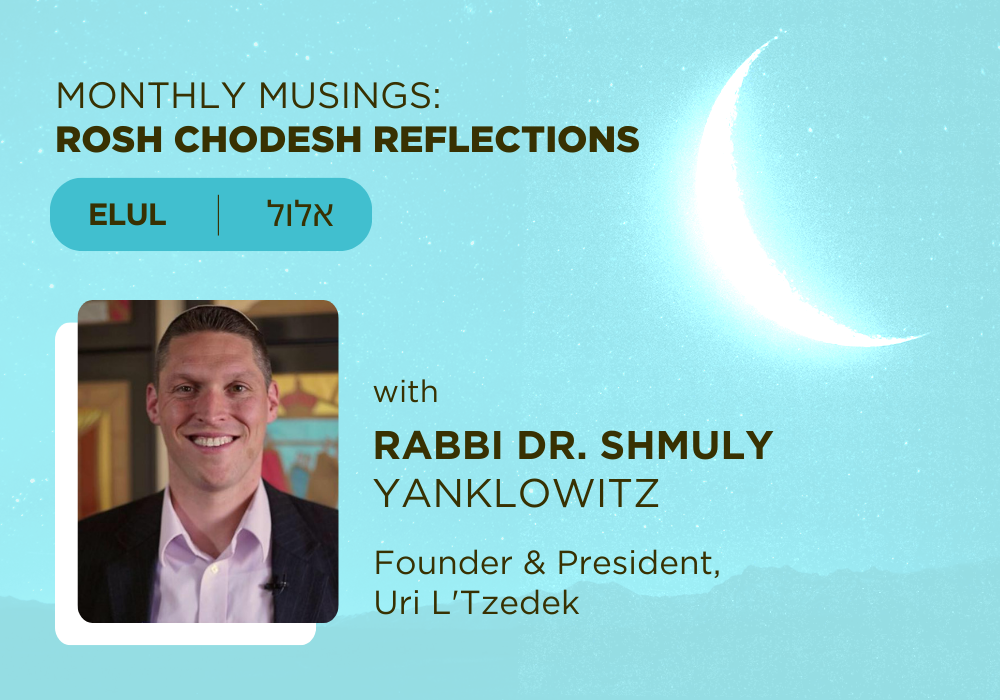Monthly Musings: Rosh Chodesh Reflections with Aviva Klompas


Welcome to Rosh Chodesh Reflections: Monthly Moments of Inspiration, an OLAM blog series!
At the start of each month on the Hebrew calendar, we invite Jewish leaders from around the world to explore the intersection of global responsibility and Jewish values. Join us, and immerse yourself in the rich Jewish tradition of pursuing justice.
This month, Tamuz, we hear from Aviva Klompas, co-founder of Boundless, former head speechwriter at Israel's Mission to the UN, and author of the new book exploring Israel's history of global development - Stand-Up Nation.
Q: What inspired you to delve into the history of Israeli involvement in global development?
Aviva: The seed of inspiration for my new book, Stand-Up Nation: Israeli Resilience in the Wake of Disaster, came from my time as speechwriter for Israel’s delegation to the United Nations. The global body deals with a surprisingly wide-ranging array of topics, but the one that most captured my imagination was international development. While doing research for speeches, I often fell down a rabbit hole reading about things I love: the stubborn tenacity of Jewish pioneers, ingenuity applied in the service of helping others, the trailblazing ways of Golda Meir, and most impressively, the story of how Israel as a fledgling developing nation founded an international development agency.
Following my time at the UN, I founded and led an initiative called Project Inspire, which took young Jewish professionals overseas to see Israel’s work in low-income nations. I am very grateful to OLAM for the support they gave me during this time. They introduced me to their partners and helped me navigate some of the ethical considerations that come with running study tours in developing nations (an extra special thanks to Dyonna for writing the forward to my new book). On study tours to Kenya, Uganda, India, Guatemala, and Nepal, my groups saw firsthand how local communities adopted Israeli know-how and technologies to combat poverty and address inequalities.
During these visits, I was often surprised to meet people in remote communities who felt strongly connected to Israel. In Uganda, we visited a tiny island on Lake Victoria. Getting there required a long bus ride, followed by a rickety boat ride, followed by a windy and bumpy bus ride. When we finally reached Osanidde Village, an orphanage for children with HIV, we were greeted by teenagers who sang the Ugandan national anthem followed by “Hatikvah,” Israel’s national anthem. Not one member of the Jewish group that accompanied me was able to sing it by heart.
It still astounds me that little Israel has had such outsized impact in the field of international development and humanitarian relief. Even more so, when you discover that Israel started its overseas work as it fought for its survival and contended with dire economic hardships. I wrote this book to share the stories of remarkable people who embody the words of Israel’s first prime minister, David Ben-Gurion who said, “It’s not enough to be up to date, you have to be up to tomorrow.”
Q: Why do you believe it's important for readers to understand the history of Israeli involvement in global development, especially in the context of today's world?
Aviva: I submitted the manuscript for this book in August of 2023. Six weeks later, on October 7, thousands of terrorists infiltrated southern Israel early on the morning of Shabbat and Simchat Torah when families were still at home in their pajamas. On that one horrific day, Hamas slaughtered more Israelis than the total number murdered throughout the Second Intifada which spanned five years.
The invading terrorists didn’t care about religion or nationality. Their victims were Jews, Muslims, Christians, Buddhists, and Druze. They murdered thirty-nine foreign workers and abducted another twenty-four, most of whom worked in agriculture on kibbutzim near Gaza. Additionally, Hamas and other terrorists murdered thirteen students participating in MASHAV agricultural courses (ten from Nepal, two from Tanzania, one from Cambodia) and took many others hostage.
Israelis, and indeed Jewish people all over the world, were gripped by grief and heartbreak. We grappled with a shattered sense of security and struggled to understand how an attack of this grotesque magnitude could have taken place inside the sovereign state of Israel. Compounding our shock was how quickly global sympathy for Israel morphed into outrage at Israel and Jewish people.
This wasn’t the first time that Israel found itself isolated and fighting for its survival. The Jewish State was founded three years after the Holocaust that had decimated European Jewry. Its earliest days were beset by overwhelming economic and military hardships that gave Israel’s leaders every reason to turn inward. Instead, they chose to engage with the world. In 1958, when Israel was itself still a struggling and impoverished developing country, it established an international development agency to reach out in friendship and support to other low-income nations.
As with every previous crisis over the past seventy-six years, we must decide whether we are destined to be a people who dwells alone. In a world that seems indifferent or even hostile to the fate of Jews, the natural inclination is to turn inward. We have long understood that we are the authors of our own story and ours is a story of human contribution. We are not meant to live in despair or accept injustice and so we turn outward, determined to build a more connected, safer, prosperous, and compassionate world.
That determination is embodied by the individuals profiled in Stand-Up Nation and I can’t wait for you to read their stories!

.png)


